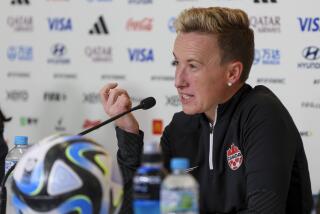Women’s World Cup isn’t lacking fireworks
- Share via
Major international soccer tournaments always produce all sorts of interesting sideshows and, one week into the Women’s World Cup in Germany, the same is holding true.
Take, for instance, the brouhaha over Nigeria Coach Eucharia Uche’s stance on gay players. Or England forward Eniola Aluko’s raw-language rant on Twitter against fans who had criticized her. Or the claims that some players who helped Equatorial Guinea qualify were men.
Strange doesn’t begin to cover it.
Then, almost inevitably considering the government involved, there was the imprisonment in Iran of journalist and women’s rights campaigner Maryam Majd just before she was to leave Tehran to cover the World Cup.
Finally, just because it wouldn’t be a World Cup without an octopus or two, we bring you Paula, successor to Paul of South Africa 2010 fame.
We kick off with Uche, the former Nigeria national team player and now national coach who got herself into trouble with FIFA, soccer’s governing body, for some eve-of-the-tournament remarks about lesbian players. In the past, Nigeria reportedly has banished gay players from its women’s team.
“Homosexuality is a dirty thing, spiritually and morally it is very, very wrong,” Uche told the German tabloid Bild. “We need divine intervention to control it and fight” it.
A dim view of this was taken by FIFA, which told her to cool it. Later, at a news conference in Berlin, Sepp Blatter, FIFA’s president, said he had no knowledge of Nigerian players ever being forced off the team because of their sexual preference.
Blatter, no doubt, was thankful that for once the questioning did not involve FIFA corruption and that no one brought up his faux pas of 2004 when he called for female players to wear “tighter shorts.”
Perhaps Blatter will have to satisfy himself with Germany’s hot sellers of the moment: the World Cup Barbie doll in a German team outfit, or the collectible cards of players from the 16 participating teams (4.5-million packs already sold) or the German edition of Playboy featuring a couple of women’s Bundesliga players.
What Blatter should be doing is demand the release of Majd, who intended to go to Germany to work on a book about women’s sports with former German international Petra Landers.
In the England camp, Aluko used her freedom of speech to slam others who were using theirs. She called tweeted criticism of her play “intrusive and poisonous” and didn’t stop there.
“If you’re an England fan and you want me to improve for the next game, and write, ‘You’re …,’ I don’t appreciate it and don’t need it,” Aluko wrote after her less-than-stellar performance in England’s tie with Mexico caused fans to lambast her.
And she wasn’t done yet.
“You can’t lace my boots,” she said. “You’re sitting on your sofa behind your keyboard [but] the next game you’ll ask me for my autograph. So don’t write . . . about me when I’m a good player and I can go into the next game and perform really well.”
So there.
Just as sharp a response came from Equatorial Guinea’s German-based captain, Genoveva Anonma, to suggestions that her team was fielding male players.
“I first heard these accusations back in 2006 and 2008,” she told Bild. “I have already been [gender] tested, which I find offensive.”
Nonetheless, Equatorial Guinea did drop two players from its roster before Germany 2011 amid claims by Nigeria and Ghana that they were men.
The tournament got off to a rocky start despite slogans plastered all over Germany pointing out that “Third Place Is for Men,” a reference to Germany’s men finishing third in the 2006 and 2010 World Cups. The German women won the 2003 and 2007 world championships.
A more realistic view of the national sentiment, however, was expressed by Michael Antwerpes, a sports commentator for the German public broadcast network ARD, when he said, on the air: “It’s the Women’s World Cup but it can be fun nonetheless.”
David James, England’s goalkeeper at South Africa 2010, thinks so. In his view, the Playboy exposure was no big deal.
“I can’t really see the problem with it,” he wrote in a column in England’s Observer newspaper. “Male footballers have taken part in photo shoots over the years; it has all become part and parcel of the rise of the celebrity footballer.
“Lots of us did male modeling — I did Armani and Eric Cantona also had a go on the catwalk for Paco Rabanne — and in the years since there have been plenty of footballers modeling underwear in sexy poster campaigns from David Beckham to Freddie Ljungberg.
“Last year in the World Cup, Didier Drogba and Cristiano Ronaldo appeared on the front cover of a magazine together wearing just their pants and showing off their sexiness.”
Less sexy but more interesting are Paula and her kin.
Eight octopi at aquariums around Germany are having their prognosticating skills tested during the tournament to see if any can match Paul, the Oberhausen seer who was eight for eight on predictions in 2010.
Sad to say, Paula picked Canada to beat Germany. It didn’t work out that way.
More to Read
Go beyond the scoreboard
Get the latest on L.A.'s teams in the daily Sports Report newsletter.
You may occasionally receive promotional content from the Los Angeles Times.










